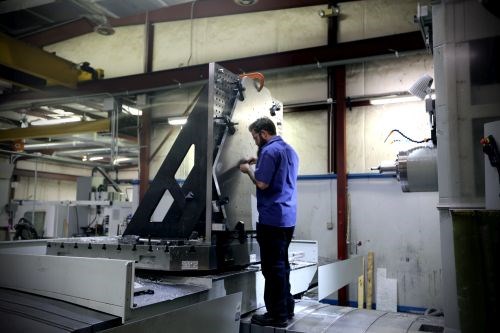MakeTime Revises Its Model
The platform where shops list their open capacity no longer requires bidding. MakeTime itself now does the costing, calculating a price for buyers and sellers to choose to accept.
Share






Open capacity at 3D-Machine can sometimes involve large-capacity machines, such as the one seen here. The shop uses the distributed manufacturing platform to obtain business from unknown companies without any of its own sales efforts.
MakeTime, the young company connecting buyers and sellers of machining services through a distributed manufacturing platform, describes itself as a “virtual machine shop of CNC machining services from qualified U.S. suppliers.” (In a nod to the popular lodging rental website Airbnb, the company also describes itself as “AirCNC.”) We first wrote about MakeTime in detail in this article, which is still essentially correct. But one important change is this: The company no longer requires shops involved in the platform to spend time on bidding. To improve efficiency, MakeTime now generates fair-market pricing for every job, with buyer and seller simply choosing whether to accept that price.
Removing bidding helps reinforce a point the company takes pains to stress: It’s not an RFQ site. Instead, the idea underlying MakeTime is capacity matching. Buyers upload machining projects, while sellers (machine shops) list their machine tools and their windows of open capacity. MakeTime’s automated process then puts the jobs and capacity together. In addition to performing costing, MakeTime also provides for file preparation, payment management, materials procurement and logistics scheduling. The company does not charge a fee, but collects a percentage of the payment for each successful job.
A recent press statement from the company included two quotes from users of the platform. From a machine shop:
“MakeTime has helped us grow our business without hiring outside salespeople,” says Greg Richardson, owner of 3D-Machine, a Georgia-based independent machine shop. He says the platform also “enables us to tap into a much larger customer base.”
And from a buyer of machined parts:
“Before MakeTime, we were doing most of our production overseas and trying to juggle expectations with different vendors,” says William Davidson, owner of Hybrid Racing, a Louisiana-based aftermarket auto parts supplier. “Now we’re able to move some of our production back to the U.S. because I can get my parts quicker while remaining cost-competitive.”
Related Content
-
Refining Shopfloor Processes for Mission-Critical Parts
Pacon Mfg, Inc. has not rested on its laurels as the 2020 Top Shop Honoree for Shopfloor Practices and Performance. In the years since, it has refined its processes to continue excelling in a volatile market.
-
How this Job Shop Grew Capacity Without Expanding Footprint
This shop relies on digital solutions to grow their manufacturing business. With this approach, W.A. Pfeiffer has achieved seamless end-to-end connectivity, shorter lead times and increased throughput.
-
How a Custom ERP System Drives Automation in Large-Format Machining
Part of Major Tool’s 52,000 square-foot building expansion includes the installation of this new Waldrich Coburg Taurus 30 vertical machining center.

















